Politics
Former chief justice Karki named Nepal’s first female leader after unrest
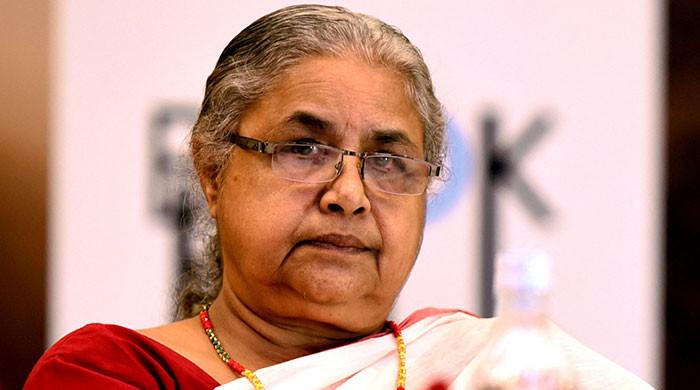
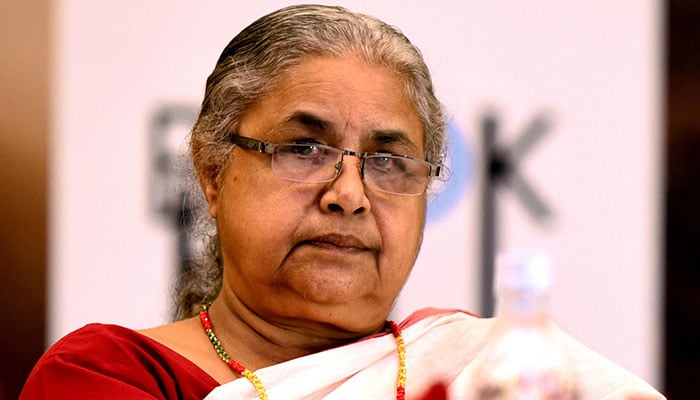
- Nepal’s first female chief justice named interim head.
- Shops reopen, cars back on roads in Kathmandu.
- Authorities begin handing over bodies of those killed.
KATHMANDU: Sushila Karki, a former chief justice, will become the first woman to lead Nepal, to be sworn in as interim leader later on Friday after violent anti-graft protests forced Prime Minister KP Sharma Oli to resign, the president’s office said.
President Ramchandra Paudel’s office announced Karki’s appointment following negotiations between Paudel, army chief Ashok Raj Sigdel and the protesters who led Nepal’s worst upheaval in years.
Fifty-one people were killed and more than 1,300 injured this week in the anti-graft protests by the “Gen Z” movement, named for the age of its mainly young supporters.
The protest was sparked by a social media ban that has since been rolled back. The violence subsided only after Oli resigned on Tuesday.
Karki, 73, would take the oath of office at 9:15pm local time, said Archana Khadka Adhikari, information officer at the president’s office. Two other ministers would also be sworn in along with her, local TV channels reported.
The only woman to have served as chief justice, Karkiwas the preferred choice of the protesters who cite her reputation for honesty and integrity and a stance against corruption.
She held the top judicial post for about a year until mid-2017.
Restoration of normalcy
Nepal has grappled with political and economic instability since the abolition of its monarchy in 2008, while a lack of jobs drives millions to seek work in other countries and send money home.
As the country of 30 million people inched back to normality on Friday – with shops reopened, cars back on roads, and police replacing the guns they wielded earlier this week with batons – families reclaimed bodies of those killed in the protests.
Some roads were still blocked, although streets were patrolled by fewer soldiers than before.
“While his friends backed off (from the protests), he decided to go ahead,” Karuna Budhathoki said of her 23-year-old nephew, as she waited to collect his body at Kathmandu’s Teaching Hospital.
“We were told he was brought dead to the hospital.”
Another protester who died, Ashab Alam Thakurai, 24, had been married only a month earlier, his relatives said.
“The last we spoke to him … he said he was stuck with the protest. After that we could not contact him … eventually we found him in the morgue,” said his uncle, Zulfikar Alam.
Politics
New York City Mayor Zohran Mamdani pledges left-wing success after taking office
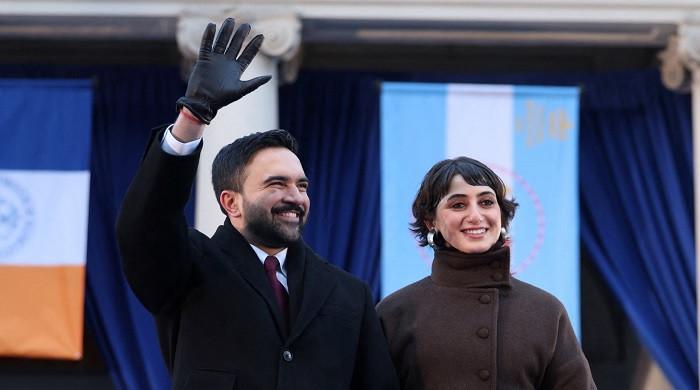

- Vows to set an example for the world through New York’s leadership.
- Centres his message on cost-of-living pressures and economic justice
- Promises to stand with those he said were betrayed by established order.
Zohran Mamdani promised Thursday to show left-wing politics can succeed as he took over as New York mayor for a term sure to see him cross swords with US President Donald Trump.
Thousands of people gathered in freezing conditions in the United States’ largest city to celebrate the 34-year-old Democrat’s inauguration after his impressive political rise from relative anonymity just a year ago.
“They want to know if the left can govern. They want to know if the struggles that afflict them can be solved,” Mamdani said outside City Hall.
“We will do something that New Yorkers do better than anyone else: we will set an example for the world,” he added in a 24-minute speech.
Mamdani, New York’s first Muslim mayor, emphasised the cost-of-living issues that were central to his mayoral campaign, as he promised to help those “betrayed by the established order”.
Left-wing allies Senator Bernie Sanders and Congresswoman Alexandria Ocasio-Cortez also delivered remarks in front of some 4000 ticketed guests.
Thousands more people thronged downtown Manhattan, many wearing yellow and blue beanies emblazoned with “Zohran”, to watch Mamdani’s ceremony on large screens.
“This is the first time that either of us in our entire lives has felt some kind of political hope at all,” 31-year-old Jacob Byerly, a scientist, told AFP alongside his wife, Auburn.
Ambitious agenda
It remains to be seen if Mamdani, a self-described democratic socialist, can deliver on his ambitious agenda, which envisions rent freezes, universal childcare and free public buses.
Once an election is over, “symbolism only goes so far with voters. Results begin to matter a whole lot more”, New York University lecturer John Kane said.
How Trump behaves could be decisive.
The Republican, himself a New Yorker, has repeatedly criticised Mamdani, but the pair held surprisingly cordial talks at the White House in November.
But one flashpoint might be immigration raids as Trump wages an expanding crackdown on migrants across the United States.
Mamdani has vowed to protect immigrant communities.
Before the November vote, the president also threatened to slash federal funding for New York if it picked Mamdani, whom he called a “communist lunatic”.
The mayor has said he believes Trump is a fascist.
Symbolic inauguration
Mamdani’s inauguration was jam-packed with symbolism.
New York Attorney General Letitia James, who successfully prosecuted Trump for fraud, performed a private midnight swearing-in at an abandoned subway station.
Mamdani’s office said the understated venue beneath City Hall reflected his commitment to working people.
And in a first for the city, Mamdani used Korans to be sworn in as mayor – two from his family and one that belonged to Puerto Rico-born Black writer Arturo Schomburg, The New York Times reported.
The new job comes with a change of address as he swaps his rent-controlled apartment in the borough of Queens for Gracie Mansion, the luxurious mayor’s residence on Manhattan’s Upper East Side.
Some had wondered if he would move to the official mansion given his campaigning on affordability issues. Mamdani said he was doing so mainly for security reasons.
Born in Uganda to a family of Indian origin, Mamdani moved to New York at the age of seven and enjoyed an elite upbringing, with only a relatively brief stint in politics.
To compensate for his inexperience, he is surrounding himself with seasoned aides recruited from past mayoral administrations and former US President Joe Biden’s government.
Mamdani has also opened dialogue with business leaders, some of whom predicted a massive exodus of wealthy New Yorkers if he won. Real estate leaders have debunked those claims.
As a defender of Palestinian rights, he will have to reassure the city’s Jewish community – the largest in the US – of his inclusive leadership.
Recently, one of his hires resigned after it was revealed she had posted antisemitic tweets years ago.
Politics
Australian cricketer Usman Khawaja hopes to inspire the ‘different’ after calling time on Test career


- Khawaja to retire after fifth Ashes Test.
- Hopes to inspire youngsters who are “different.”
- Batter hits out at media treatment after recent injury.
Star Aussie batter Usman Khawaja on Friday said he hoped his long Test career, which will come to an end with his retirement after the fifth Ashes clash, inspires youngsters who are “different” that playing cricket for Australia is possible.
The top order batsman, who turned 39 last month, announced on Friday that he would be retiring from international cricket after his 88th Test, which will start at Sydney Cricket Ground on Sunday.
Khawaja made his Test debut at the same ground in the final match of the 2010-11 Ashes series and has since scored 6,206 runs at an average of 43.39, including 16 centuries.
More than his runs, however, Khawaja was a standard-bearer for diversity in Australian cricket, given he was born in Pakistan before being raised in Sydney from the age of five.
“I hope I’ve inspired many children along the way, particularly those who feel that they are different, those who feel that they don’t belong, or those others tell that they will never make it,” Khawaja told reporters at a press conference.
“I felt all these things growing up and trying to be an Australian cricketer, but seeing is believing. And I’m here to tell you that you can do whatever you want. Just got to keep trying.
“I’m a proud Muslim, coloured boy from Pakistan who was told that he would never play for the Australian cricket team. Look at me now. You can do the same.”
Khawaja batted for most of his Test career at the top of the middle order but lost his spot in the side for the 2021-22 Ashes series to Marnus Labuschagne.
He was, however, called up at the last minute when Travis Head contracted COVID ahead of the Sydney Test and revived his career with centuries in both innings.
Opening with Warner
After that, Khawaja moved up to form a successful opening partnership with David Warner, who retired from Test cricket after the SCG Test two years ago.
In this Ashes series, he injured his back in the opener in Perth and missed the second Test before initially being dropped from the team for the third in Adelaide.
He was again recalled at the eleventh hour after Steve Smith suffered a bout of vertigo and, batting at number four rather than opening, scored 82 and 40 as Australia won by 82 runs to clinch the series and retain the urn.
Khawaja said his treatment by the media after the back injury in Perth was proof that he was still treated differently from other players because of his background.
“The way the media and the past players came out and attacked me … I copped it for about five days straight,” he recalled.
“It was quite personal in terms of things like, ‘he’s not committed to the team. He was only worried about himself. He played this golf comp the day before.
“He’s selfish. He doesn’t train hard enough. He didn’t train the day before the game. He’s lazy. These are the same racial stereotypes I’ve grown up with my whole life.
“I just want the journey for the next Usman Khawaja to be different,” he added. “I want you to treat him the same, not have racial stereotypes of who they might be.”
Politics
Dubai transports over 2.8 million passengers during New Year 2026 celebrations
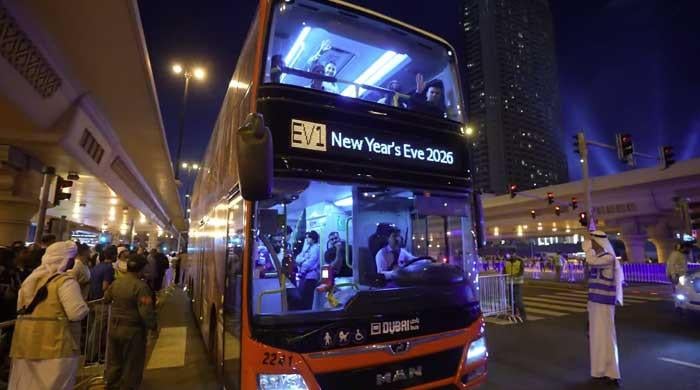
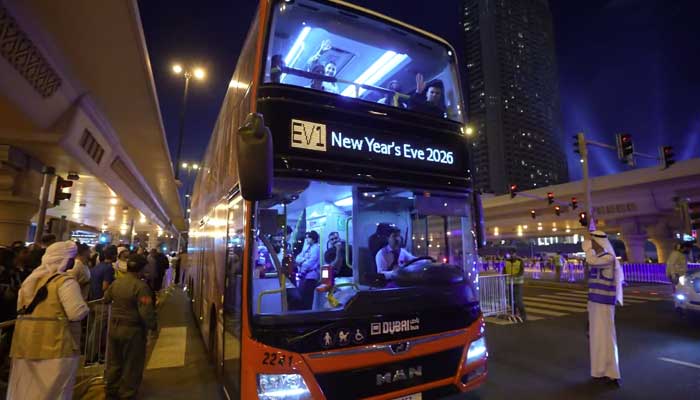
DUBAI: Dubai’s Roads and Transport Authority (RTA) said it transported more than 2.8 million passengers during the New Year 2026 celebrations, marking an increase of over 13% compared with the previous year.
The rise came under an integrated traffic and operational plan that included traffic management measures and temporary road closures across the emirate. The plan was implemented in coordination with Dubai’s Event Security Committee, government authorities, and strategic partners, the RTA said.
More than 2,836,000 passengers used public transport, taxis, e-hailing services, and shared mobility options on New Year’s Eve 2026, up from 2,502,000 passengers recorded during the same period in 2025.
The Dubai Metro’s Red and Green lines carried around 1.25 million passengers, while the Dubai Tram transported about 58,000 passengers. Public buses and on-demand bus services carried more than 503,000 passengers, and taxis transported around 662,000 passengers.
Marine transport services carried nearly 77,000 passengers, while e-hailing vehicles transported about 286,000 passengers. Shared mobility services carried around 1,500 passengers, the authority said.
The authority said the traffic and operational plan helped ensure the safe and smooth movement of the public to and from celebration venues, highlighting Dubai’s capacity to manage large-scale events in line with international standards.
-

 Sports6 days ago
Sports6 days agoBrooks Koepka should face penalty if he rejoins PGA Tour, golf pundit says
-

 Business6 days ago
Business6 days agoGovt registers 144olive startups | The Express Tribune
-
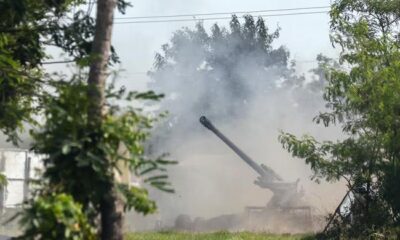
 Politics6 days ago
Politics6 days agoThailand, Cambodia agree to ‘immediate’ ceasefire: joint statement
-
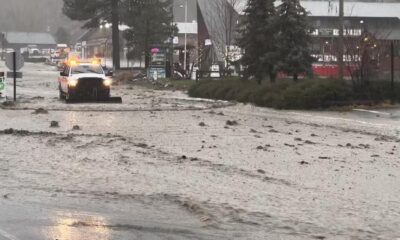
 Politics6 days ago
Politics6 days agoHeavy rains, flash floods leave Southern California homes caked in mud
-
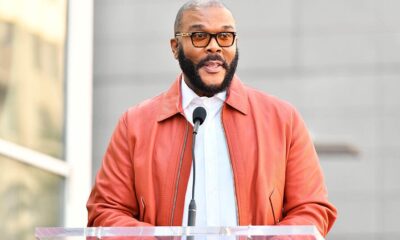
 Entertainment6 days ago
Entertainment6 days agoSecond actor accuses Tyler Perry of sexual assault in new lawsuit
-

 Fashion6 days ago
Fashion6 days agoArea CG’s Fernando Rius says luxury is not about buying something expensive, it is about understanding the culture, history, and time invested
-

 Fashion6 days ago
Fashion6 days agoClimate change may hit RMG export earnings of 4 nations by 2030: Study
-

 Entertainment7 days ago
Entertainment7 days agoInside royal families most private Christmas moments






